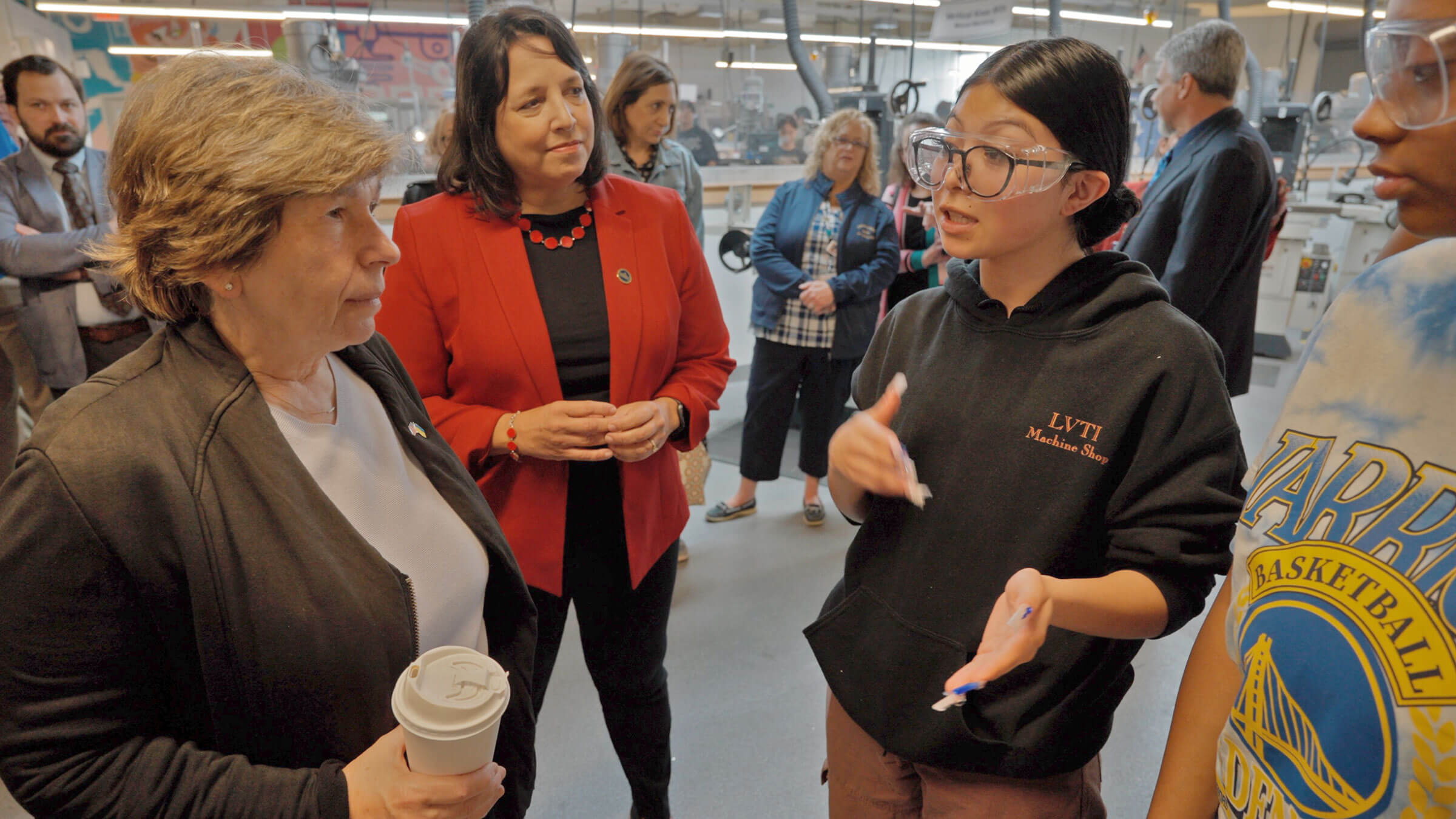Smears vs. solutions
Parents do not want to see their kids’ teachers attacked and their schools politicized.

Weingarten, left, and Mass. Lt. Gov. Kim Driscoll, center, listen to a student at Lynn Vocational and Technical High School in Lynn, Mass., on June 9.
Summer is upon us, and parents, children and teachers are winding down from what has been an exhausting and fully operational school year—the first since the devastating pandemic. The long-lasting impact of COVID-19 has affected our students’ and families’ well-being and ignited the politics surrounding public schools. All signs point to the coming school year unfolding with the same sound and fury, and if extremist culture warriors have their way, being even more divisive and stressful.
The cause? The far right’s assault on public education, which they’re waging by attacking teachers and their students and trying to pit parents against us. Legislators in 45 states have proposed hundreds of laws to ban books in classrooms and school libraries—from the illustrated adaption of Anne Frank’s The Diary of a Young Girl to Amanda Gorman’s poem “The Hill We Climb,” restrict what can be taught about our country’s history, and promote school vouchers that drain money from public schools. This agenda does nothing to support kids’ learning. It does nothing to address learning loss, rein in social media and bullying, stop gun violence, or support the record number of children struggling with mental health challenges. In Florida, for example, the latest state budget takes $4 billion in funding away from these efforts and funnels it into a voucher program.
But it turns out, book banning, educational censorship and defunding public schools are wildly unpopular. While extremists say their effort is about parents’ rights, national polling shows they’ve overreached, because voters, including parents, say they do not want to see their kids’ teachers attacked and their schools politicized. A recent NPR/Ipsos poll found that most Americans (65 percent), including Republicans, oppose book bans; a majority (80 percent) support teaching race as part of our history; and 70 percent approve of their local public school teachers. Another recent poll done by the parents group Moms Rising found even higher support among moms, with 94 percent of mothers supporting teaching honest history and 78 percent opposing book bans.
Most parents want what we all want: for our children to do well in the basics like reading, math and science. They want to ensure all children, regardless of background, develop critical-thinking and practical life skills and are prepared to succeed in the future. And by an 80 percent to 20 percent margin, voters and parents want legislators to focus on improving education in public schools rather than promoting divisive political issues or expanding school choice programs that take resources out of public school classrooms.
Educators want that too—bigtime. It’s why we are expanding community schools that are built on partnerships to make schools hubs for providing needed services, from academic supports to legal aid to nutrition and health, helping students focus on learning.
And it’s why we’re investing in experiential learning, which helps students develop lifelong skills, using their minds and hands to learn everything from welding and auto repair to nursing, graphic design, computer science, culinary skills and plumbing.
It’s also why we’re focusing on literacy and creating joyful, confident readers with the AFT’s Reading Opens the World program, which has handed out more than 1.5 million books to students and their families and helps teachers access reading instruction support.
These foundational approaches change lives and, developed in close partnership with parents, will equip our kids with the knowledge, skills and understanding they need for college, career and life. Culture wars do the opposite.
If our extremist opponents think their attacks will slow down America’s educators or disrupt our efforts to organize and improve the lives of workers, they’re mistaken. Good things continue to happen in schools, and parents, workers and communities continue to come together to support our pro-student, pro-family, pro-worker agenda.
For example, United Teachers Los Angeles negotiated an innovative contract that provides an additional $250,000 for each community school and lets educators partner on a virtual learning platform that keeps students connected to their classrooms. The United Federation of Teachers in New York City also broke ground with its new contract, securing retention bonuses to keep teachers in their jobs and expanding a pilot remote learning project that allowed small schools to offer virtual courses—such as Advanced Placement Chemistry—that they otherwise couldn’t because of staffing issues. The Florida Education Association has signed up 5,000 new members despite Gov. Ron DeSantis’ anti-education and anti-union policies. And the Chicago Teachers Union helped elect one of their own, Brandon Johnson, as mayor, despite the money spent by former Education Secretary Betsy DeVos and her cronies to defeat him.
So, the other side can keep waging their political attacks. And we will keep problem-solving. We are bringing communities together and strengthening and improving public education. Our opponents should never underestimate the creativity or commitment of teachers, and all those who work in schools, when it comes to improving the lives of the kids we teach and their families.
A message from our Publisher & CEO Rachel Fishman Feddersen

I hope you appreciated this article. Before you go, I’d like to ask you to please support the Forward’s award-winning, nonprofit journalism during this critical time.
We’ve set a goal to raise $260,000 by December 31. That’s an ambitious goal, but one that will give us the resources we need to invest in the high quality news, opinion, analysis and cultural coverage that isn’t available anywhere else.
If you feel inspired to make an impact, now is the time to give something back. Join us as a member at your most generous level.
— Rachel Fishman Feddersen, Publisher and CEO















